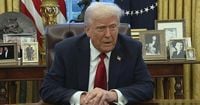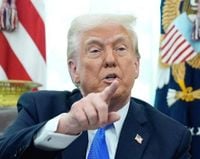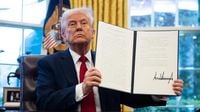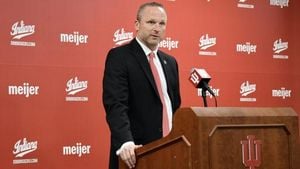The White House has confirmed that President Donald Trump will announce significant tariffs on the auto industry during a press conference today. According to White House spokeswoman Karoline Leavitt, the president will speak at 4:00 PM (21:00 in Italy) from the Oval Office to outline the details of these tariffs.
In a bold move, Trump has proposed a 25% "permanent" tariff on foreign cars imported into the United States, set to take effect on April 2, 2025. This date has been dubbed the "Liberation Day" by the president, coinciding with reciprocal tariffs against 15 countries with which the U.S. has unfavorable trade balances. Trump has asserted that this decision aims to stimulate domestic car production, claiming that many manufacturers are already scouting for sites to build vehicles in the U.S.
However, this initiative has raised concerns among industry experts and market analysts. Wall Street reacted negatively to the announcement, with stocks in major automotive companies dropping by approximately 2-3% before and after the official announcement. General Motors and Stellantis are among the companies that saw declines, signaling apprehension about the potential financial impact of the tariffs.
European Commission President Ursula von der Leyen expressed her "deep regret" over the U.S. decision, stating, "Tariffs are taxes: harmful for businesses, worse for consumers, in the U.S. and the EU. The EU will continue to seek negotiated solutions while safeguarding our economic interests." This sentiment reflects widespread concern among European leaders, particularly from countries like Germany and Italy, where the automotive industry plays a crucial role in the economy.
Canadian Prime Minister Mark Carney also criticized the tariffs, labeling them as a "direct attack" on Canada, which is a significant exporter of automotive products to the U.S. The Canadian government is expected to respond to these tariffs, which could escalate tensions in North American trade relations.
Trump's announcement included a promise that those who finance an American-made vehicle will be able to deduct the interest from their tax returns, which he claims will further incentivize the purchase of domestically produced cars. He stated, "If companies produce cars in the United States, there will be no tariffs," emphasizing that the tariffs are intended to encourage investment in U.S. manufacturing.
While the president insists that these tariffs will generate revenue for the U.S. government—projecting earnings between $600 million and $1 trillion over two years—critics warn that the move could lead to higher prices for consumers. The tariffs are expected to affect nearly half of all vehicles sold in the U.S., which are imported, as well as around 60% of parts used in vehicles assembled in the country.
In light of these developments, the European Commission has already prepared a countermeasure package worth €26 billion in tariffs, which will come into effect on April 12, 2025. This includes a 50% tariff on bourbon, which France successfully postponed after Trump threatened to impose 200% tariffs on French champagne and wine.
Trump's aggressive trade policies have drawn sharp criticism, with many questioning the long-term effects on both the U.S. economy and international relations. The automotive sector, which relies heavily on global supply chains, may face significant challenges as manufacturers adjust to new tariffs and potential retaliatory measures from affected countries.
As the situation unfolds, the president's remarks during the press conference will be closely scrutinized, particularly regarding whether parts and components will be exempt from these tariffs. Trump has indicated that these tariffs will be "permanent" and will add to existing tariffs already in place.
In addition to the automotive tariffs, Trump has hinted at further tariffs on pharmaceutical products and imported lumber, indicating a broader strategy of protectionism aimed at reshaping U.S. trade practices.
The announcement of the tariffs has also coincided with troubling news from the U.S. Department of Health, which has canceled over $12 billion in federal grants to states that monitor infectious diseases and provide essential health services. This decision has raised alarms among health officials, who fear it could exacerbate existing public health crises.
As the automotive tariffs loom, the president's administration faces mounting pressure to clarify its trade policies and address the concerns of both domestic and international stakeholders. The coming days will likely reveal more about the potential fallout from these tariffs and how they will shape the future of the automotive industry in the U.S. and beyond.






